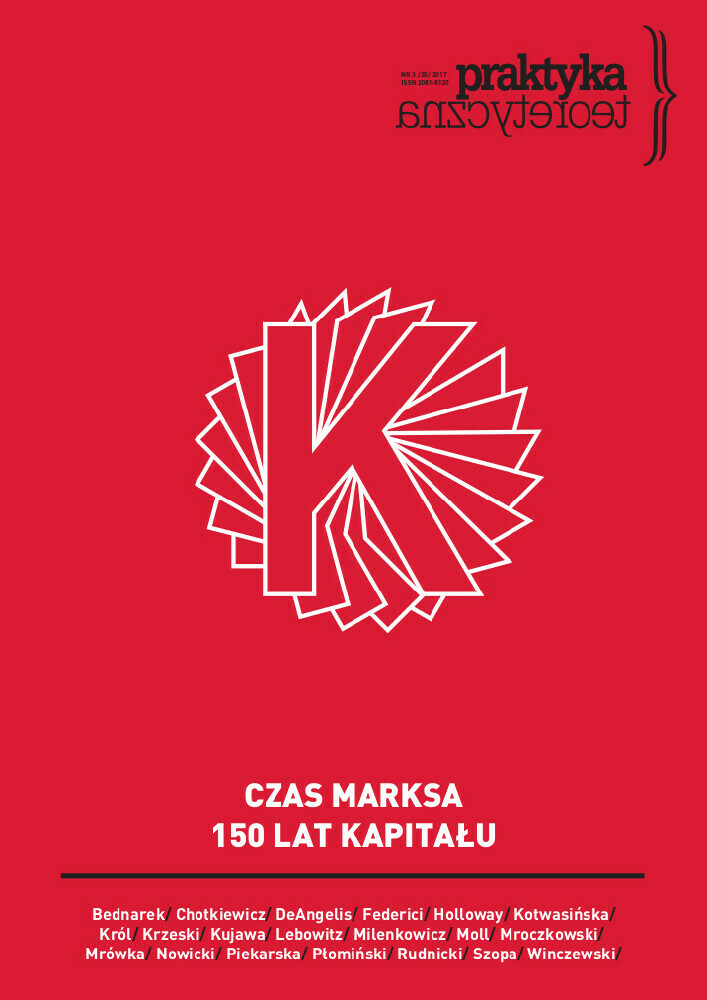Abstrakt
Celem artykułu1 jest próba rekonstrukcji projektu utopijnego społeczeństwa zarysowanego w pracy An American Utopia. Dual Power and the Universal Army Fredrica Jamesona. Ramę interpretacyjną stanowi ujęcie utopii jako modalności oraz przekonanie o podsumowującym charakterze, jaki tekst ten stanowi w ramach twórczości autora. Szczegółowej uwadze poddany został sposób, w jaki utopijna spekulacja Jamesona stara się przenegocjować swoją własną niemożliwość.Bibliografia
Adorno, Theodor. 1986. Dialektyka negatywna. Tłum. i wstęp: Krystyna Krzemieniowa, współpraca Sław Krzemień-Ojak. Warszawa: PWN.
Adorno, Theodor. 1999 Minima Moralia. Refleksje z poharatanego życia. Tłum. Małgorzata Łukasiewicz, posł. Marek J. Siemek. Kraków: Wydawnictwo Literackie.
Bloch, Ernst. 1987. The Utopian Function of Art and Literature: Selected Essays. Tłum. Jack Zipes, Frank Mecklenberg. Cambridge, Massachusetts: MIT Press.
Buchanan, Ian. 1998. „Metacommentary on utopia, or Jameson's dialectics of hope”. Utopian Studies 9/2: 18–30.
Jameson, Fredric. 1981. The Political Unconscious. Narrative as a Socially Symbolic Act. Ithaca, New York: Cornell University Press.
Jameson, Fredric. 1990. Late Marxism. Adorno, Or, The Persistence of the Dialectic. Verso: London.
Jameson, Fredric. 1994. The Seeds of Time. The Wellek Library lectures at the University of California, Irvine. New York: Columbia University Press.
Jameson, Fredric. 2002. A Singular Modernity. Essay on the Ontology of the Present. London: Verso.
Jameson, Fredric. 2004. „The Politics of Utopia”. New Left Review 25: 35–54.
Jameson, Fredric. 2008. The Ideologies of Theory. London: Verso.
Jameson, Fredric. 2009. Valences of the Dialectic. London: Verso.
Jameson, Fredric. 2011. Archeologie przyszłości. Pragnienie zwane utopią i inne fantazje naukowe. Tłum. Maciej Płaza, Małgorzata Frankiewicz, Andrzej Miszk. Kraków: Wydawnictwo Uniwersytetu Jagiellońskiego.
Jameson, Fredric. 2016. An American Utopia. W American Utopia. Dual Power and the Universal Army. Fredric Jameson, red. Slavoj Zizek. London: Verso.
Lenin, Włodzimierz. 1917. O dwuwładztwie. https://www.marxists.org/polski/lenin/1917/04/09dwuw.htm.
Lukács, György. 1958. Od Goethego do Balzaca. Studia z historii literatury XVIII i XIX wieku. Tłum. Zdzisław Herebet, Ryszard Matuszewski, Czesław Przymusiński, Krzysztof Wolicki, Maciej Żurowski. Warszawa: Państwowy Instytut Wydawniczy.
Macdonald, Iain. 2017. „Adorno’s Modal Utopianism: Possibility and Actuality in Adorno and Hegel”. Adorno Studies 1:1, January 2017: 2–13.
Marcuse, Herbert. 2014. Marxism, Revolution and Utopia. London and New York: Routledge.
Mittelstadt, Jennifer. 2015. The Rise of the Military Welfare State. Cambridge: Harvard University Press.
Toscano, Alberto. 2016. After October, Before February: Figures of Dual Power. W American Utopia. Dual Power and the Universal Army, Fredric Jameson , red. Slavoj Zizek. London: Verso.
Trocki, Lew. 1932. Rozdwojenie władzy. https://www.marxists.org/polski/trocki/1930/hrr/11.htm.
Licencja
Autorzy:
„Praktyka Teoretyczna” jest pismem, które chce realizować idee wolnego dostępu do wiedzy i poszerzania domeny dobra wspólnego. Ma służyć rozwojowi nauki i krytycznej refleksji w Polsce i na świecie w imię idei wolnego dostępu do wiedzy (Open Access). Całe pismo jest udostępniane za darmo w Internecie na warunkach licencji CC-BY-NC-SA (Uznanie autorstwa-Użycie niekomercyjne-Na tych samych warunkach 4.0 Międzynarodowe) w wersji 4.0 (szczegółowe warunki: http://creativecommons.org/licenses/by-nc-sa/4.0/). Artykuły w nim zamieszczone mogą być dowolnie przechowywane, kopiowane, drukowane, rozpowszechniane i wykorzystywane do celów naukowo-dydaktycznych przy zachowaniu warunków licencji. Apelujemy tylko o uznanie autorstwa i podanie źródła w myśl przyjętych w środowisku naukowym standardów.
Nie ma natomiast możliwości komercyjnego wykorzystania zgromadzonych zasobów bez pisemnej zgody wydawcy. Dostęp do czasopisma nie może być dystrybuowany za opłatą czy w jakikolwiek inny sposób limitowany przez inne podmioty.
Autorzy tekstów przyjętych do publikacji w czasopiśmie „Praktyka Teoretyczna” są zobowiązani do wypełnienia, podpisania i odesłania na adres redakcji umowy o udzielenie nieodpłatnej licencji do utworów, z zobowiązaniem do udzielania sublicencji CC [PL.pdf, PL.doc, EN.pdf, EN.doc].
Zgodnie z umową, autorzy tekstów opublikowanych w czasopiśmie „Praktyka Teoretyczna” udzielają wydawcy czasopisma niewyłącznej i nieodpłatnej licencji oraz zezwalają na użycie sublicencji Creative Commons Uznanie autorstwa-Użycie niekomercyjne-Na tych samych warunkach 4.0 Międzynarodowe (CC-BY-NC-SA 4.0).
Autorzy zachowują prawa do dalszego, swobodnego rozporządzania utworem.
Autorzy nadsyłanych artykułów powinni upewnić się, czy wykorzystywane przez nich materiały nie są chronione prawami autorskimi na rzecz innych osób i ponoszą odpowiedzialność za ewentualne uchybienia w tym względzie.
